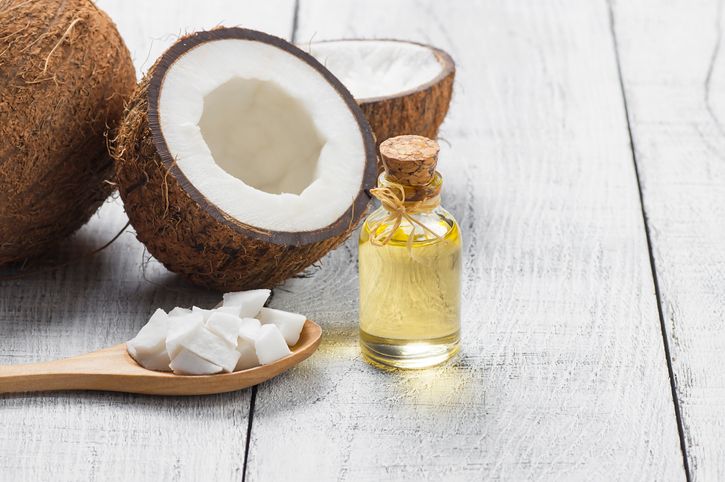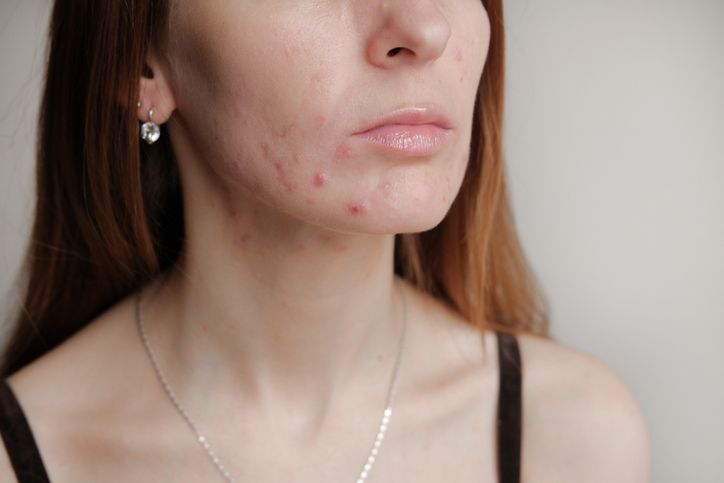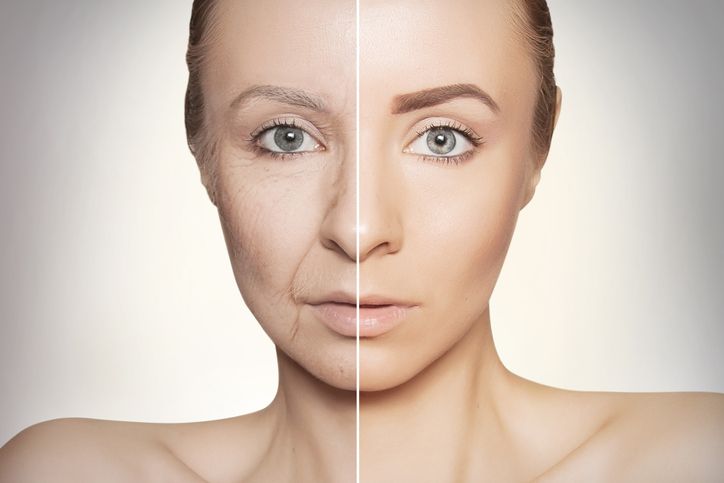
- Home
- Trend
- Weight Loss Strategies
- Acne Tips
- Hair Health Information
- Blemish Removal Tips
- Acne Scar Removal Tips
- Muscle Building Techniques
- Intimate Care Tips
- Postpartum Intimate Care
- Eye Bags Wiki
- Tips for Face Slimming
- Secret of Permanent Hair Removal
- Breast Enlargement Tips
- Cure to Snoring
- Marionette Lines
- Skin-Tightening Secrets

免費體驗
Ultra V Lift Pro Non-Surgical Instant Facelift Treatment
1 Minute Self-Registration
Date should not be before minimal date
If you've been searching for a natural solution to improve your skin, look no further than coconut oil. This versatile ingredient is packed with moisturizing properties that can hydrate and nourish your skin. From reducing inflammation to healing and soothing, coconut oil has the potential to address various skin concerns. You'll discover why it is beneficial to the skin and learn how to incorporate it into your skincare routine for maximum benefits.
1
Moisturizing Properties

Coconut oil has exceptional moisturizing properties that can effectively hydrate and nourish your skin. Its ability to deeply penetrate the skin and retain moisture makes it an excellent choice for dry and dehydrated skin. The fatty acids present in the oil, such as lauric acid and caprylic acid, help to strengthen the skin's natural barrier, preventing water loss and maintaining hydration levels.
Studies have shown that coconut-extracted oil can improve skin hydration and increase the lipid content of the skin. In a study published in the International Journal of Dermatology, researchers found that applying coconut oil to the skin significantly increased skin hydration compared to a mineral oil-based moisturizer. Another study published in the Journal of Drugs in Dermatology demonstrated that coconut-extracted oil can improve the skin's barrier function and reduce water loss.
Not only does coconut oil moisturize the skin, but it also provides a protective layer that can help to prevent moisture loss throughout the day. This makes it particularly beneficial for individuals with dry and sensitive skin, as it helps to soothe and relieve dryness and irritation.
To use coconut-extracted oil as a moisturizer, simply warm a small amount between your palms and gently massage it into your skin. It can be used on the face and body, and is suitable for all skin types. However, if you have oily or acne-prone skin, it's recommended to patch test coconut oil first, as it may be too heavy and potentially clog pores.

2
Anti-Inflammatory Benefits for Skin

To continue the discussion on the benefits of coconut-extracted oil for the skin, let's explore its anti-inflammatory properties. Coconut-extracted oil contains several compounds that have been found to possess anti-inflammatory effects. Here are four reasons why coconut oil can be beneficial for reducing inflammation in the skin:
1. Calms irritated skin:
Coconut oil can help soothe irritated skin by reducing redness, swelling, and itching. Its anti-inflammatory properties can provide relief to conditions such as eczema, psoriasis, and dermatitis.
2. Fights acne:
Acne is often accompanied by inflammation, and coconut oil can help alleviate this. Its anti-inflammatory properties can help reduce the redness and swelling associated with acne, promoting a clearer complexion.
3. Speeds up wound healing:
Inflammation is a natural response to injury, but excessive inflammation can delay the healing process. Coconut-extracted oil's anti-inflammatory properties can help regulate the inflammatory response, promoting faster wound healing and reducing the risk of infection.
4. Protects against sun damage:
Exposure to the sun can cause inflammation in the skin. Applying coconut oil topically can help reduce sunburn and soothe the skin, thanks to its anti-inflammatory compounds.
Incorporating coconut oil into your skincare routine can provide anti-inflammatory benefits, soothing irritated skin, fighting acne, promoting wound healing, and protecting against sun damage. Remember to patch test before using coconut-extracted oil, as it may not be suitable for everyone.
3
Healing and Soothing Effects on Skin

Healing and soothing the skin, coconut-extracted oil provides relief to various skin concerns. Coconut oil has been praised for its ability to promote wound healing and reduce inflammation. It contains lauric acid, which has antimicrobial properties that help prevent infection in wounds and promote faster healing. Additionally, coconut oil has moisturizing properties that can soothe dry and irritated skin. It forms a protective barrier on the skin, preventing moisture loss and allowing the skin to retain its natural hydration.
Furthermore, coconut-extracted oil has been found to be effective in soothing skin conditions such as eczema and psoriasis. Its anti-inflammatory properties can help reduce redness, itching, and swelling associated with these conditions. Coconut oil also contains antioxidants that can help repair damaged skin cells and promote overall skin health.
To use coconut oil for healing and soothing the skin, simply apply a small amount to the affected area and gently massage it in. It can be used as a standalone treatment or in combination with other skincare products. However, it's important to note that coconut-extracted oil may not be suitable for everyone, especially those with oily or acne-prone skin. It's always recommended to patch test before using coconut oil on the face or body.

4
Reduction of Acne and Blemishes

Reducing acne and blemishes can be achieved with the use of coconut-extracted oil. Here are four reasons why coconut-extracted oil is effective in treating acne and blemishes:
1. Antibacterial properties:
Coconut oil contains lauric acid, which has antibacterial properties that can help fight the bacteria that cause acne. Applying coconut-extracted oil to the affected areas can help reduce inflammation and prevent further breakouts.
2. Moisturizing effect:
Contrary to popular belief, acne-prone skin still needs proper hydration. Coconut oil acts as an excellent moisturizer, keeping the skin hydrated without clogging the pores. This can help balance the skin's natural oils and prevent excess sebum production that leads to acne.
3. Anti-inflammatory properties:
Coconut oil contains compounds like capric acid and caprylic acid, which have anti-inflammatory properties. These compounds can help reduce redness, swelling, and inflammation associated with acne, promoting faster healing of breakouts.
4. Scar healing:
Coconut-extracted oil can also aid in reducing acne scars and blemishes. Its moisturizing properties can help soften the skin and improve its texture, making scars less noticeable over time.
By incorporating coconut-extracted oil into your skincare routine, you can effectively reduce acne and blemishes, leading to clearer and healthier skin.
Now, let's move on to discussing the anti-aging effects of coconut oil on the skin.

免費體驗
Ultra V Lift Pro Non-Surgical Instant Facelift Treatment
1 Minute Self-Registration
Date should not be before minimal date
5
Anti-Aging Effects on Skin

By incorporating coconut oil into your skincare routine, you can experience the anti-aging effects it has on your skin. Coconut-extracted oil is rich in antioxidants, which help to combat the damage caused by free radicals. Free radicals are unstable molecules that can damage collagen and elastin, leading to wrinkles and sagging skin. The antioxidants in coconut-extracted oil help to neutralize these free radicals, reducing the signs of aging.
In addition to its antioxidant properties, coconut oil also contains medium-chain fatty acids (MCFAs). These MCFAs have been found to have moisturizing and nourishing effects on the skin. They penetrate deep into the skin, hydrating and plumping it, which can help to reduce the appearance of fine lines and wrinkles.
Furthermore, coconut oil has been shown to have anti-inflammatory properties. Inflammation can contribute to the aging process, as it can break down collagen and elastin. By reducing inflammation, coconut-extracted oil can help to maintain the integrity of these structural proteins, keeping the skin firm and youthful.
To incorporate coconut-extracted oil into your skincare routine, start by cleansing your face with a gentle cleanser. Then, apply a small amount of coconut oil to your skin, massaging it with upward strokes. Allow the oil to absorb into your skin for a few minutes before applying any additional products or makeup.
It's important to note that while coconut oil can be beneficial for most skin types, it may not be suitable for everyone. If you have oily or acne-prone skin, it's best to patch test coconut-extracted oil on a small area of your skin before using it all over your face. If you experience any irritation or breakouts, discontinue use.

6
10 Tips to Use Coconut Oil for Your Skin

Here are 10 tips to incorporate coconut-extracted oil into your skincare routine and achieve healthier, more glowing skin!
1. Treating Mild Wounds
To treat mild wounds, you can apply coconut oil directly onto the affected area for its healing properties. Coconut-extracted oil is a versatile ingredient in skin care and has numerous benefits for your skin. When applied topically, it helps moisturize the skin and improve its appearance and texture. Coconut-extracted oil also enhances the skin's natural barrier function, preventing moisture loss and protecting against irritants.
Its antibacterial properties can help treat skin conditions caused by bacterial infections. Additionally, coconut oil has anti-inflammatory effects, which can reduce redness, swelling, and irritation in the skin. While coconut-extracted oil can provide relief for mild wounds, it's important to note that it shouldn't replace proper medical treatment for more serious injuries.
Always consult with a healthcare professional for proper wound care advice.
2. Soothing Dry Skin
If you're looking to soothe dry skin, coconut oil can be a great natural remedy. Here are three ways coconut-extracted oil can help soothe your dry skin:
1. Deep hydration: Coconut-extracted oil is rich in fatty acids that penetrate the skin and provide deep hydration. It nourishes and replenishes dry and cracked skin, restoring lost moisture and leaving your skin feeling soft and supple.
2. Strengthening the skin barrier: The fatty acids in coconut oil help strengthen the skin barrier, which is important for retaining moisture. By enhancing the skin's natural barrier function, coconut oil prevents moisture loss and protects against irritants, making it an excellent choice for dry and sensitive skin types.
3. Treating eczema: Coconut-extracted oil has been found to be effective in treating eczema, a condition characterized by dry and itchy skin. Its moisturizing properties help reduce symptoms and provide relief from the discomfort associated with eczema.
Using coconut-extracted oil for dry skin can be a simple and effective way to nourish and hydrate your skin naturally.
3. Calming Temporary Skin Redness
To calm temporary skin redness, apply a small amount of coconut oil directly to the affected area and gently massage it into the skin. Coconut-extracted oil has potential anti-inflammatory properties that may help reduce inflammation and improve the appearance of your skin. Its moisturizing benefits can also help soothe and hydrate irritated skin.
Coconut-extracted oil contains antioxidants that can combat oxidative stress and inflammation. By applying coconut-extracted oil to your skin, you can benefit from its calming effects on temporary skin redness. Incorporating coconut oil into your skincare routine may help reduce inflammation and promote healthier-looking skin.
Remember to use high-quality, organic, and unrefined coconut oil for the best results.
4. Removing Makeup
To remove makeup, start by applying a small amount of coconut-extracted oil to a cotton pad or your fingertips. Gently massage the coconut-extracted oil onto your face, focusing on areas with heavy makeup. Allow the coconut-extracted oil to dissolve the makeup for a few minutes. Use a damp cloth or cotton pad to wipe away the makeup and excess oil.
Coconut oil is a natural and gentle option for removing makeup. It effectively breaks down stubborn makeup, including waterproof mascara, while nourishing and moisturizing the skin. Whether you choose virgin coconut oil, refined coconut oil, cold-pressed coconut oil, or organic coconut oil, make sure to choose a high-quality oil for the best results.
5. Moisturizing Lip Balm
Continuing with the benefits of coconut oil for skin care, moisturizing lip balm is an excellent way to keep your lips hydrated and nourished.
Coconut oil, known for its moisturizing properties, can provide the essential hydration that your lips need, especially during dry and cold weather. When used in lip balms, coconut oil helps to lock in moisture, preventing your lips from becoming dry, chapped, and cracked.
It also acts as a protective barrier, shielding your lips from harsh environmental factors. The nourishing properties of coconut oil can also help to improve the overall texture and appearance of your lips, leaving them soft, smooth, and supple.
6. Homemade Gentle Lip Scrub
For your homemade gentle lip scrub, gather a few simple ingredients to create a nourishing and exfoliating treatment for your lips. Here's what you'll need:
1. Coconut oil: Coconut oil is a versatile ingredient in skin care due to its moisturizing and antibacterial properties. It will help hydrate and nourish your lips.
2. Sugar: Sugar acts as a natural exfoliant, gently removing dead skin cells and leaving your lips smooth and soft.
3. Honey: Honey is known for its moisturizing and healing properties. It will help soothe and repair your lips, leaving them supple and healthy.
To make the lip scrub, mix equal parts coconut oil and sugar in a small bowl. Add a teaspoon of honey and mix well. Gently massage the scrub onto your lips in circular motions for a minute or two, then rinse off with warm water. Follow up with a moisturizing lip balm for extra hydration.
7. Hydrating Eye Cream
Applying a hydrating eye cream can help nourish and moisturize the delicate skin around your eyes. When choosing an eye cream, look for one that contains coconut oil, as it has excellent hydrating properties.
Coconut oil acts as a natural moisturizer, penetrating deeply into the skin to provide hydration and nourishment. It helps to replenish lost moisture and strengthen the skin barrier, making it particularly beneficial for dry skin. The hydrating properties of coconut oil can help reduce dryness, soothe any irritation, and improve the overall appearance and texture of the skin around your eyes.
8. Dewy Cheek Highlighter
To achieve a dewy cheek highlighter look, you can easily create a natural glow by incorporating coconut oil into your makeup routine. Here's how coconut oil can help you achieve that radiant look:
1. Hydration: Coconut oil is deeply moisturizing, making it perfect for dry skin. It helps to hydrate your cheeks, giving them a healthy and dewy appearance.
2. Skin Nourishment: Coconut oil is rich in fatty acids that nourish and strengthen the skin. It can improve the texture of your cheeks, making them look smoother and more radiant.
3. Versatility: Coconut oil can be used in multiple ways to create a dewy cheek highlighter. You can mix a small amount of coconut oil with your liquid or cream highlighter for a natural and glowing finish. Alternatively, you can apply a thin layer of coconut oil on your cheeks before applying powder highlighter to enhance its shine and longevity.
9. Nature Eczema Relief
For natural eczema relief, coconut oil can be a beneficial and soothing option for your skin. Coconut oil for skin care is known for its moisturizing properties, which can help alleviate dryness and reduce itching associated with eczema. The fatty acids present in coconut oil help to hydrate and nourish the skin, promoting skin barrier repair.
Additionally, coconut oil may help treat eczema due to its anti-inflammatory effects. It can help reduce redness, swelling, and irritation on the skin. Coconut oil is also known for its antimicrobial properties, which can help prevent infections and promote healing.
To use coconut oil for eczema relief, apply a thin layer to the affected areas and gently massage it into the skin. Repeat this process regularly to achieve the best results.
10. Anti-Aging Serum for Fine Lines and Wrinkles
Smooth away fine lines and wrinkles with an invigorating coconut oil anti-aging serum. This natural serum harnesses the power of coconut oil to nourish and rejuvenate your skin, leaving it looking youthful and radiant. Here are three reasons why this serum is a must-have in your skincare routine:
1. Deep moisturization: Coconut oil is rich in fatty acids that deeply hydrate the skin, providing intense moisture to plump up fine lines and smooth out wrinkles.
2. Anti-aging properties: The natural antioxidants in coconut oil help to combat free radicals and protect the skin from damage, reducing the appearance of fine lines and wrinkles.
3. Skin rejuvenation: Coconut oil promotes the production of collagen, a protein that gives skin its elasticity. By boosting collagen production, this anti-aging serum helps to firm and tighten the skin, reducing the signs of aging.
Experience the incredible benefits of coconut oil for your skin with this revitalizing anti-aging serum.
7
Conclusion

Incorporating coconut oil into your skincare routine can be a natural and effective way to enhance the health and appearance of your skin. From moisturizing and repairing the skin barrier to treating acne and reducing signs of aging, coconut oil offers a range of benefits.
However, it's important to use it with caution and not as a substitute for medical treatments. So, embrace the wonders of coconut oil and let your skin shine with radiance and vitality.

8
Want baby-smooth skin FAST? Here's the Ultra V Lift Pro Non-Surgical Instant Facelift Treatment!

As you can see, coconut oil is beneficial to a variety of skin concerns. Among all benefits, the most impressive one has to be plumping the skin and smoothing wrinkles! However, this benefit is temporary, superficial and takes a long time to manifest. Instead, why not treat yourself to a convenient skin firming treatment that addresses deep-seated wrinkles for long-lasting anti-aging results?
Perfect Medical's Ultra V Lift Pro Non-Surgical Instant Facelift Treatment is the golden standard of non-surgical face slimming and tightening procedures! This treatment emits the patented TDT™ thermal diffusion energy threads 4.5mm into the fascia layer (SMAS) at the deepest, stimulating collagen production to firm the skin and enhance the facial contours, giving you smooth skin with no sagginess!
If you are someone who is afraid of pain or surgical procedure, this non-invasive skin-lifting treatment is perfect for you! This treatment ensures high comfort, brings no damages to the skin or body, and requires zero recovery time! Simply register now for your free trial plus free consultation!

免費體驗
Ultra V Lift Pro Non-Surgical Instant Facelift Treatment
1 Minute Self-Registration
Date should not be before minimal date
FAQ

Can Coconut Oil Be Used as a Natural Sunscreen?
Yes, coconut oil can be used as a natural sunscreen. It has a low SPF of around 4-6, which provides minimal protection. However, it's not as effective as commercial sunscreens and may not provide adequate protection against harmful UV rays.
Is Coconut Oil Suitable for All Skin Types?
Coconut oil works wonders for all skin types. It moisturizes dry skin, soothes sensitive skin, and even balances oily skin. It's like a superhero that saves the day, no matter what your skin concerns may be.
Can Coconut Oil Help With Eczema or Psoriasis?
Yes, coconut oil can help with eczema or psoriasis. It has anti-inflammatory properties that soothe the skin and reduce redness. Apply a thin layer to the affected areas daily for relief.
How Often Should Coconut Oil Be Applied to the Skin?
You might think slathering coconut oil on your skin is a good idea, but applying it too often can clog pores and lead to breakouts. Stick to using it sparingly for best results.
Are There Any Potential Side Effects of Using Coconut Oil on the Skin?
Coconut oil can cause potential side effects on the skin, such as clogged pores, acne breakouts, and allergic reactions. It's important to do patch tests and use in moderation to avoid any adverse reactions.








